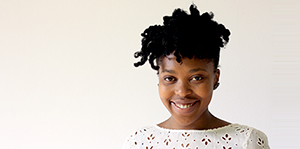
’Manapo ’Mokose who was awarded a prize for the best Honours
essay at the 2016 South African Association of Political Studies
(SAAPS) awards.
Photo: Supplied
“The UFS gets so little recognition. I hope that winning this award will attest to its strength as a genuine avenue for student success.”
This was the message from ’Manapo ’Mokose to students at the University of the Free State (UFS) after being awarded a prize for the best Honours essay at the 2016 South African Association of Political Studies (SAAPS) awards.
Mokose in a nutshell
’Mokose, who completed her degree in Political Science and Business Management at UFS went on to pursue an Honours degree in International Relations. The topic of her essay was The BRICS Development Bank in the New World Order: Reflections on Africa and China.
Voicing frustration at how little people engaged with political issues, ’Mokose pointed to the reality that political awareness empowered people to influence their environment.
She was candid about her struggles with self-doubt and shared that to her the award meant she had a clue after all and was certainly on the right track.
UFS support meant the world
According to ’Mokose none of this would have been possible without the love and support she received from the UFS. She gave special recognition to her supervisor Prof Theo Neethling in the Department of Political Studies. “I would not have received this award without him,” she said.
The award ceremony took place on 1 September 2016 in Cape Town.
’Mokose is currently doing her Masters in International Relations at the University of Cape Town and is an intern at the Institute for African Alternatives.